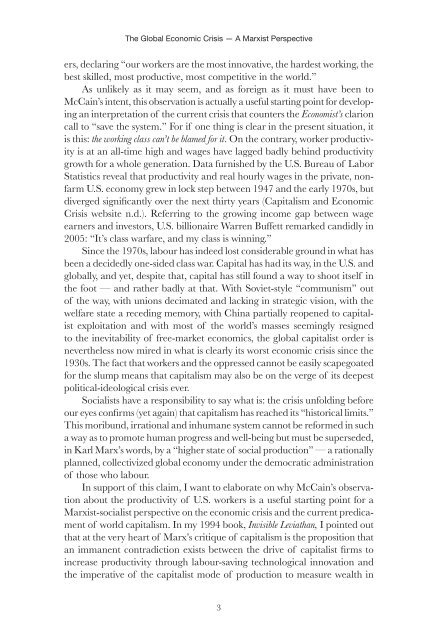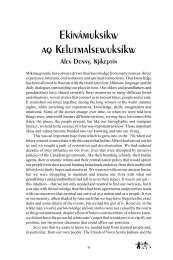The Global Economic Crisis — A Marxist Perspective - Fernwood ...
The Global Economic Crisis — A Marxist Perspective - Fernwood ...
The Global Economic Crisis — A Marxist Perspective - Fernwood ...
You also want an ePaper? Increase the reach of your titles
YUMPU automatically turns print PDFs into web optimized ePapers that Google loves.
<strong>The</strong> <strong>Global</strong> <strong>Economic</strong> <strong>Crisis</strong> <strong>—</strong> A <strong>Marxist</strong> <strong>Perspective</strong><br />
ers, declaring “our workers are the most innovative, the hardest working, the<br />
best skilled, most productive, most competitive in the world.”<br />
As unlikely as it may seem, and as foreign as it must have been to<br />
McCain’s intent, this observation is actually a useful starting point for developing<br />
an interpretation of the current crisis that counters the Economist’s clarion<br />
call to “save the system.” For if one thing is clear in the present situation, it<br />
is this: the working class can’t be blamed for it. On the contrary, worker productivity<br />
is at an all-time high and wages have lagged badly behind productivity<br />
growth for a whole generation. Data furnished by the U.S. Bureau of Labor<br />
Statistics reveal that productivity and real hourly wages in the private, nonfarm<br />
U.S. economy grew in lock step between 1947 and the early 1970s, but<br />
diverged significantly over the next thirty years (Capitalism and <strong>Economic</strong><br />
<strong>Crisis</strong> website n.d.). Referring to the growing income gap between wage<br />
earners and investors, U.S. billionaire Warren Buffett remarked candidly in<br />
2005: “It’s class warfare, and my class is winning.”<br />
Since the 1970s, labour has indeed lost considerable ground in what has<br />
been a decidedly one-sided class war. Capital has had its way, in the U.S. and<br />
globally, and yet, despite that, capital has still found a way to shoot itself in<br />
the foot <strong>—</strong> and rather badly at that. With Soviet-style “communism” out<br />
of the way, with unions decimated and lacking in strategic vision, with the<br />
welfare state a receding memory, with China partially reopened to capitalist<br />
exploitation and with most of the world’s masses seemingly resigned<br />
to the inevitability of free-market economics, the global capitalist order is<br />
nevertheless now mired in what is clearly its worst economic crisis since the<br />
1930s. <strong>The</strong> fact that workers and the oppressed cannot be easily scapegoated<br />
for the slump means that capitalism may also be on the verge of its deepest<br />
political-ideological crisis ever.<br />
Socialists have a responsibility to say what is: the crisis unfolding before<br />
our eyes confirms (yet again) that capitalism has reached its “historical limits.”<br />
This moribund, irrational and inhumane system cannot be reformed in such<br />
a way as to promote human progress and well-being but must be superseded,<br />
in Karl Marx’s words, by a “higher state of social production” <strong>—</strong> a rationally<br />
planned, collectivized global economy under the democratic administration<br />
of those who labour.<br />
In support of this claim, I want to elaborate on why McCain’s observation<br />
about the productivity of U.S. workers is a useful starting point for a<br />
<strong>Marxist</strong>-socialist perspective on the economic crisis and the current predicament<br />
of world capitalism. In my 1994 book, Invisible Leviathan, I pointed out<br />
that at the very heart of Marx’s critique of capitalism is the proposition that<br />
an immanent contradiction exists between the drive of capitalist firms to<br />
increase productivity through labour-saving technological innovation and<br />
the imperative of the capitalist mode of production to measure wealth in<br />
3





